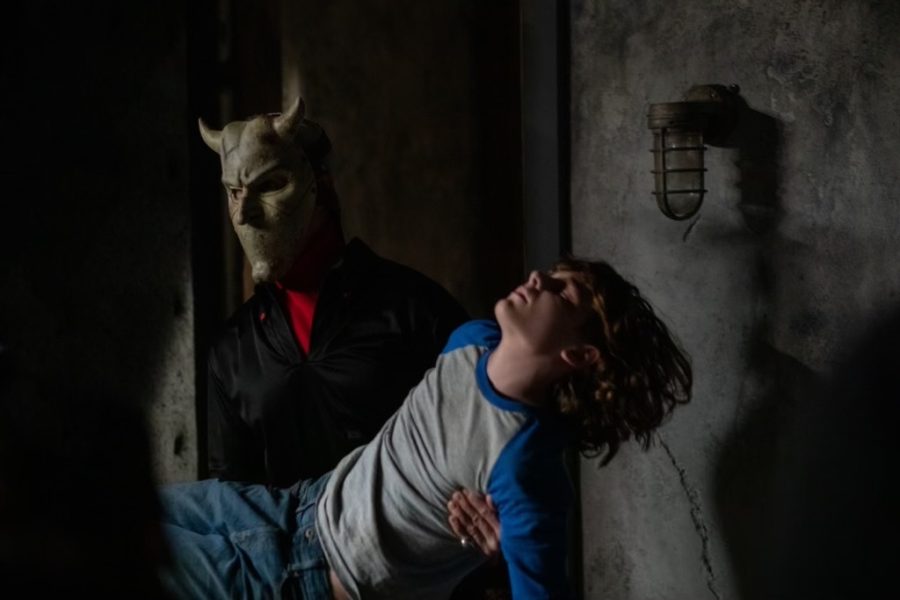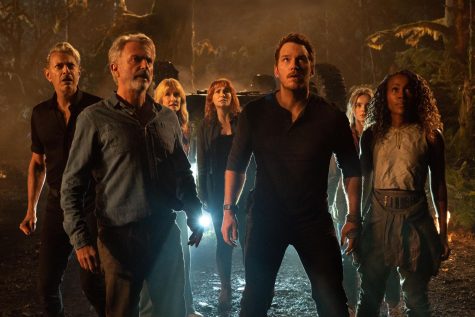‘The Black Phone’ Terrifies with Creepy Villain
June 23, 2022
Scott Derrickson’s “The Black Phone,” follows a town struggling with a string of child abductions done at the hands of the Grabber (Ethan Hawke). A young boy named Finney (Mason Thames) gets nabbed by the Grabber, and the only way Finney can escape comes in the form of a black phone that allows him to talk to other missing kids. Meanwhile, his sister Gwen (Madeleine McGraw) utilizes psychic powers to discover the Grabber’s identity and help the police track her lost brother.
Ethan Hawke seemingly does the unattainable for modern horror movies by making a slasher-esque character genuinely terrifying. While classic characters like Michael Myers or Jigsaw aren’t found particularly scary, Hawke plays a character that genuinely brings back the audience’s “stranger danger” instincts. Hawke wears a mask the entire movie, often switching it to match his expressions, yet somehow, his eyes are all audiences need to see to know what the Grabber is thinking. His manipulative manner and overall treatment of Finney invokes tension equivalent to walking on eggshells. The shot of Hawke sitting shirtless in a kitchen with a mask and a belt sounds ridiculous on paper, but the direction of the shot with the added context of the character’s intentions is eerie and unpleasant. Audiences can see that Hawke is enjoying the development of his villain arc through every action and decision he makes.
Child actors are typically nothing to write home about because their performances rely on the ability of the director to direct kids. However, in “The Black Phone,” every child actor gives a great performance that rivals the kid actors of IT (2017), with Thames as Finney and McGraw as Gwen especially standing out. This sibling duo showcases chemistry through the roof, creating an extremely believable older brother-younger sister relationship. The first part of the movie builds up their relationship before their separation until the end of the movie. Because of the built-up relationship, their separation hurts that much more, but it allows each actor to have their own moments to shine. McGraw had many quips and one-liners that are sure to make audiences laugh. Her plot line definitely drives the narrative forward but serves as a tension breaker from the more intense moments of the movie. Thames gives a performance that showcases raw emotion. Audiences witness all the stages of grief after Finney realizes how dire his situation is, and once he powers through, he becomes strong, making audiences feel as if Finney is not only protecting himself, but everyone.
Scott Derrickson proves his place as a horror legend, considering the amount of movies he’s made within the genre. He mastered the art of creating a jumpscare by using long periods of silence, and he mastered the horror aesthetic by utilizing old-looking, grainy shots for specific sections of his movies. These two elements appear again in “The Black Phone” and continue to prove that Derrickson knows the art to a good scare.
Audiences will love “The Black Phone” thanks to its rich storytelling, heartfelt sibling relationship and terrifying, unique villain played by Ethan Hawke. Be prepared to be scared, and maybe don’t have your popcorn in your hand the entire time — you might end up throwing it everywhere.
4 ½ black phones out of 5









